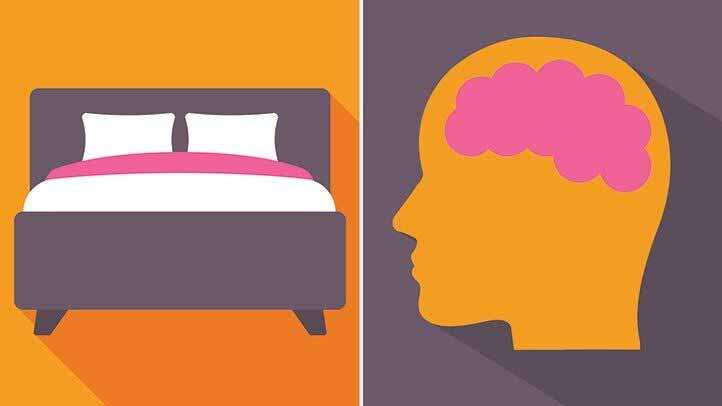
Consistently sleeping well plays a big role in keeping day-to-day thinking sharp, as well as protecting the brain against memory problems down the line, like Alzheimer’s disease and other types of dementia.
If you want to preserve and protect your memory, sleep on it. That advice comes from researchers who study the inextricable link between sleep, thinking, and memory.
Our sleep is part of our fundamental biology, says Michael Twery, MD, former director of the National Center of Sleep Disorders Research at the National Institutes of Health’s (NIH) Heart, Lung, and Blood Institute in Bethesda, Maryland. “It is ingrained in the chemistry of how every cell is organized — including the processes that regulate how we manage and express emotions, how we respond to the world, and how we learn.”
Anyone who has attempted to stay up all night knows that thinking tends to be fuzzier the following day. But thanks to more clinical research in this area, the reasons performance suffers are becoming clearer.
What have we learned? Deep sleep is when critical parts of the memory storage process happen. And important brain waste removal processes also happen during sleep that help clear out toxic brain byproducts that naturally accumulate throughout the day as a result of normal activity and functioning. When sleep doesn’t happen (or not enough of it happens) all of these processes can be interrupted, and thinking and memory can suffer as a result.
The Learning Process Happens During Wakefulness and During Sleep
Sleep has long been recognized as being critical for memory consolidation, according to research. You’re likely familiar with the part of learning that happens while you’re awake, such as when you read an article like this one or you engage in a conversation with a friend. But whether or not you can recall those thoughts and conversations later depends on other processes that happen during sleep, too.
Making memories consists of:
- Encoding You’re exposed to new information and it gets encoded in the brain during waking hours, leaving a memory “trace.” At this point, new memories are highly vulnerable to being forgotten.
- Consolidation New information is sorted, categorized, and stored in different brain areas for later retrieval during the stages of deep sleep. This is when new memories get integrated into already existing knowledge networks in the brain (so you can recall them later).
- Retrieval The task of recall, or remembering, reaches into the brain’s storehouses to access relevant information; now filed away as memories.
While encoding and retrieval occur during waking hours, consolidation requires the kind of high-quality sleep that is in line with the seven to nine hours recommended by the Centers for Disease Control and Prevention (CDC) and which includes several cycles of all the different stages of sleep, including light sleep, deep slow wave sleep, and rapid eye movement, or REM, sleep.
“We believe each [sleep] stage has a distinct role in consolidating information,” explains Aleksandar Videnovic, MD, the director of the division of sleep medicine at Massachusetts General Hospital in Boston.
All Stages of Sleep Play a Role in Helping Memories Stick
What researchers do know about the memory consolidation that happens during sleep is that it’s complicated and several different regions of the brain are working on different tasks. “Patterns of electrical activity are changing as brain cell connections are established, changed, and remodeled,” Dr. Twery says.
And, as Dr. Videnovic explains, each stage of sleep likely plays a role in making memories stick.
One review explained the roles that both slow wave and REM sleep play in making different kinds of memories stick:
- Slow wave sleep is the period of deep sleep when the brain begins to sort through, recognize, and consolidate declarative or factual information acquired during the day.
- REM sleep is critical to procedural learning (the step-by-step integration of facts into a larger process) and motor skills (such as remembering how to perform a specific technique, like swinging a golf club).
“Slow wave sleep sets the stage, while REM programs the connections and ‘grows’ the brain. Together, they explain why ‘sleeping on it’ after working to learn some motor skills, like playing piano, seems to strengthen the training process,” Twery explains.
In one report, researchers described sleep as a period of “memory triage,” where the brain looks for common patterns in new information, determines a set of rules to categorize the information it has, and integrates the new information into the brain’s vast and constantly evolving store of knowledge. Before information is filed, it is evaluated for its relevance and relationships to what else you know.
Our Brains Also Clean House as We Sleep
Sleep not only helps capture and store new information, but research has identified a “janitorial” process that happens in the brain during sleep. While you’re cycling through sleep, the brain removes the daytime buildup of toxic proteins, which if allowed to accumulate in the brain can clog and kill healthy neurons, as well as the memories they store.
“During quality sleep, we’ve learned that there is an opening up of certain barriers between the brain and the rest of the circulation that might allow amyloid protein to be properly cleared,” says Arjun Masurkar, MD, PhD, assistant professor of neurology at New York University’s Langone Health Center for Cognitive Neurology in New York City.
Amyloid has been found in the “plaques and tangles” of the brains belonging to people with Alzheimer’s disease and are implicated, along with tau protein, in many forms of dementia. Amyloid refers to proteins that fold in mutated and potentially damaging ways.
One study found that there were quantifiable increases in the amount of harmful amyloid protein in the brains of healthy individuals after just a single night of not sleeping. The study authors note in that paper there is still a lot to understand about how amyloid builds up, but the data suggests sleep deprivation may have a very negative effect when it comes to the buildup of harmful amyloid proteins.
The current research suggests that the filtering and cleaning out process that happens during sleep could help prevent the damage that can lead to the memory loss associated with Alzheimer’s disease, Dr. Masurkar says.
The Bottom Line: There Are a Lot of Processes That Happen During Sleep That Protect Thinking and Memory
Together the research reveals the vital role sleep plays when it comes to thinking and memory.
The more that is understood about how these harmful proteins accumulate and lead to memory problems, the more can be learned about how to stop that process from happening or reverse it, Masurkar says. “As we’re learning more about the clearance process, it seems possible that we may be able to develop strategies to open the brain barriers, using drugs or technologies like ultrasound to help filter out amyloid.”
Until miracle cures arrive, however, our best bet in terms of protecting brain health and lowering our risk of sleep-related memory issues is getting not only enough sleep, but also quality sleep.
“We can’t yet prevent dementia or solve the problem of cognitive impairment,” Videnovic says, “but we can find ways to optimize sleep.”
Editorial Sources and Fact-Checking
- Rasch B, Born J. About Sleep’s Role in Memory. Physiological Reviews. April 2013.
- How Much Sleep Do I Need? Centers for Disease Control and Prevention. September 14, 2022.
- Stickgold R. Sleep-Dependent Memory Consolidation. Nature. October 27, 2005.
- Stickgold R, Walker M. Sleep-Dependent Memory Triage: Evolving Generalization Through Selective Processing. Nature Neuroscience. February 2013.
- Iliff JJ, Wang M, Liao Y, et al. A Paravascular Pathway Facilitates CSF Flow Through the Brain Parenchyma and the Clearance of Interstitial Solutes, Including Amyloid ß. Science Translational Medicine. August 15, 2012.
- Shokri-Kojori E, Wang GJ, Wiers CE, et al. ß-Amyloid Accumulation in the Human Brain After One Night of Sleep Deprivation. PNAS. April 24, 2018.
Important Notice: This article was originally published at www.everydayhealth.com by Susan K. Treiman where all credits are due. Medically reviewed by Daniel Barone, MD.
Disclaimer
The watching, interacting, and participation of any kind with anything on this page does not constitute or initiate a doctor-patient relationship with Dr. Farrah™. None of the statements here have been evaluated by the Food and Drug Administration (FDA). The products of Dr. Farrah™ are not intended to diagnose, treat, cure, or prevent any disease. The information being provided should only be considered for education and entertainment purposes only. If you feel that anything you see or hear may be of value to you on this page or on any other medium of any kind associated with, showing, or quoting anything relating to Dr. Farrah™ in any way at any time, you are encouraged to and agree to consult with a licensed healthcare professional in your area to discuss it. If you feel that you’re having a healthcare emergency, seek medical attention immediately. The views expressed here are simply either the views and opinions of Dr. Farrah™ or others appearing and are protected under the first amendment.
Dr. Farrah™ is a highly experienced Licensed Medical Doctor certified in evidence-based clinical nutrition, not some enthusiast, formulator, or medium promoting the wild and unrestrained use of nutrition products for health issues without clinical experience and scientific evidence of therapeutic benefit. Dr. Farrah™ has personally and keenly studied everything she recommends, and more importantly, she’s closely observed the reactions and results in a clinical setting countless times over the course of her career involving the treatment of over 150,000 patients.
Dr. Farrah™ promotes evidence-based natural approaches to health, which means integrating her individual scientific and clinical expertise with the best available external clinical evidence from systematic research. By individual clinical expertise, I refer to the proficiency and judgment that individual clinicians acquire through clinical experience and clinical practice.
Dr. Farrah™ does not make any representation or warranties with respect to the accuracy, applicability, fitness, or completeness of any multimedia content provided. Dr. Farrah™ does not warrant the performance, effectiveness, or applicability of any sites listed, linked, or referenced to, in, or by any multimedia content.
To be clear, the multimedia content is not intended to be a substitute for professional medical advice, diagnosis, or treatment. Always seek the advice of your physician or other qualified health providers with any questions you may have regarding a medical condition. Never disregard professional medical advice or delay in seeking it because of something you have read or seen in any website, video, image, or media of any kind. Dr. Farrah™ hereby disclaims any and all liability to any party for any direct, indirect, implied, punitive, special, incidental, or other consequential damages arising directly or indirectly from any use of the content, which is provided as is, and without warranties.








